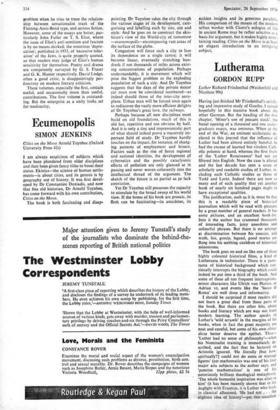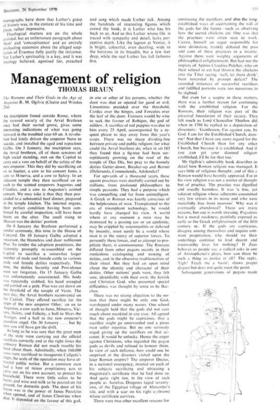Lutherama
GORDON RUPP
Luther Richard Friedenthal (Weidenfeld and Nicolson 90s) Having just finished Mr Friedenthal's satisfy- ing and impressive study of Goethe, I turned hopefully to this massive book about the other German. But the heading of the first chapter, 'Miner's son of peasant stock', the banal opening of a thousand and one under- graduate essays, was ominous. When at the end of the War, an eminent ecclesiastic de- clared in this journal that the influence of Luther had been almost entirely baneful. he had the excuse of learned but virulent Cath- olic polemic at hand, whereas the first fruits of the 'Luther Renaissance' had not yet filtered into English. Now the case is altered and the last decade has seen a score of scholarly and readable studies of Luther. in- cluding such Catholic studies as those of Todd and Lortz. Indeed there are now so many and of such quality that yet another book of nearly six hundred pages ought to have exceptional qualities.
The justification, such as it is, must be that this is a readable piece of historical journalism which will be read with pleasure by a great number of general readers. It has some pidtures, and an excellent book-list. Into it the author has crammed thousands of interesting facts, juicy anecdotes and colourful phrases. But there is no attempt at discrimination between his sources, and truth, lies, gossip, legend, good stories are flung into his seething cauldron of historical minestrone.
The book goes on and on like one of those highly coloured historical films, a kind of Lutherama in technicolor. There is a pano- rama of historical background which con- tinually interrupts the biography Which could indeed be put into a third of the book. And some of these all too frequent interruptions. minor characters like Ulrich von Hutten, or Adrian VI, and events like the 'Sacco di Roma' are well done and informative.
I should be surprised if most readers did not learn a great deal from these parts of the book. But there are other bits, about books and literacy which are way out from modern learning. The author speaks of Luther's 'wild scrawls' in the margins of his books, when in fact the great majority are neat and careful, but some of his own ()biter dicta better deserve the epithet. Thus— 'Luther had no sense of philosophy'—when his Nominalist training is immediately de- scribed, and the fact that he lectured on Aristotle ignored. 'He literally [but how, spiritually?] could not do sums or manage figures' (yet mathematics was one of his four major arts subjects as the author says, and `punctus mathematicus' is one of his notoriously brilliant theological metaphors). The whole humanist inspiration was alien to him' (it has been recently shown that in ins dogfight with Erasmus, it is Luther who leads in classical allusions). 'He had not . . . the slightest idea of history'—yet two excellent monographs have show that Luther's grasp of history was, in the context of his time and place, rather impressive. Theological matters are on the whole avoided, but an unfortunate paragraph about 'flesh' and 'concupiscence' and an entirely misleading statement about the alleged scep- ticism of Erasmus fully justify the reticence. Yet Luther's spirituality is a key, and it was theology believed, agonised for, preached and sung which made Luther tick. Among the hundreds of interesting figures which crowd the book, it is Luther who has his back to us. And so this Luther whose life is traced with sympathy and detail, lacks per- ceptive depth. Like the lagoon at Venice, it is bright, colourful, even dazzling, wide to the horizons in its breadth, but a few feet deep, while the real Luther lies full fathoms five.



































 Previous page
Previous page